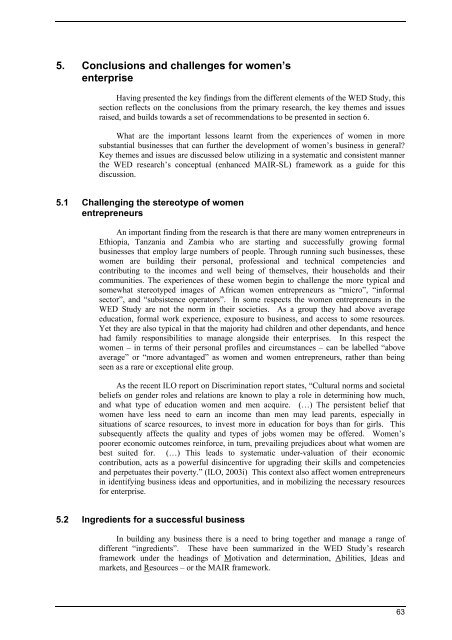The Challenges of Growing Small Businesses - International Labour ...
The Challenges of Growing Small Businesses - International Labour ...
The Challenges of Growing Small Businesses - International Labour ...
You also want an ePaper? Increase the reach of your titles
YUMPU automatically turns print PDFs into web optimized ePapers that Google loves.
5. Conclusions and challenges for women’s<br />
enterprise<br />
Having presented the key findings from the different elements <strong>of</strong> the WED Study, this<br />
section reflects on the conclusions from the primary research, the key themes and issues<br />
raised, and builds towards a set <strong>of</strong> recommendations to be presented in section 6.<br />
What are the important lessons learnt from the experiences <strong>of</strong> women in more<br />
substantial businesses that can further the development <strong>of</strong> women’s business in general?<br />
Key themes and issues are discussed below utilizing in a systematic and consistent manner<br />
the WED research’s conceptual (enhanced MAIR-SL) framework as a guide for this<br />
discussion.<br />
5.1 Challenging the stereotype <strong>of</strong> women<br />
entrepreneurs<br />
An important finding from the research is that there are many women entrepreneurs in<br />
Ethiopia, Tanzania and Zambia who are starting and successfully growing formal<br />
businesses that employ large numbers <strong>of</strong> people. Through running such businesses, these<br />
women are building their personal, pr<strong>of</strong>essional and technical competencies and<br />
contributing to the incomes and well being <strong>of</strong> themselves, their households and their<br />
communities. <strong>The</strong> experiences <strong>of</strong> these women begin to challenge the more typical and<br />
somewhat stereotyped images <strong>of</strong> African women entrepreneurs as “micro”, “informal<br />
sector”, and “subsistence operators”. In some respects the women entrepreneurs in the<br />
WED Study are not the norm in their societies. As a group they had above average<br />
education, formal work experience, exposure to business, and access to some resources.<br />
Yet they are also typical in that the majority had children and other dependants, and hence<br />
had family responsibilities to manage alongside their enterprises. In this respect the<br />
women – in terms <strong>of</strong> their personal pr<strong>of</strong>iles and circumstances – can be labelled “above<br />
average” or “more advantaged” as women and women entrepreneurs, rather than being<br />
seen as a rare or exceptional elite group.<br />
As the recent ILO report on Discrimination report states, “Cultural norms and societal<br />
beliefs on gender roles and relations are known to play a role in determining how much,<br />
and what type <strong>of</strong> education women and men acquire. (…) <strong>The</strong> persistent belief that<br />
women have less need to earn an income than men may lead parents, especially in<br />
situations <strong>of</strong> scarce resources, to invest more in education for boys than for girls. This<br />
subsequently affects the quality and types <strong>of</strong> jobs women may be <strong>of</strong>fered. Women’s<br />
poorer economic outcomes reinforce, in turn, prevailing prejudices about what women are<br />
best suited for. (…) This leads to systematic under-valuation <strong>of</strong> their economic<br />
contribution, acts as a powerful disincentive for upgrading their skills and competencies<br />
and perpetuates their poverty.” (ILO, 2003i) This context also affect women entrepreneurs<br />
in identifying business ideas and opportunities, and in mobilizing the necessary resources<br />
for enterprise.<br />
5.2 Ingredients for a successful business<br />
In building any business there is a need to bring together and manage a range <strong>of</strong><br />
different “ingredients”. <strong>The</strong>se have been summarized in the WED Study’s research<br />
framework under the headings <strong>of</strong> Motivation and determination, Abilities, Ideas and<br />
markets, and Resources – or the MAIR framework.<br />
63
















